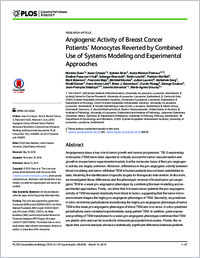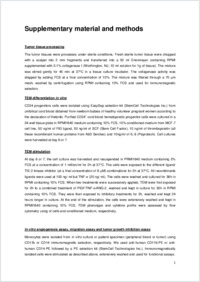Angiogenic activity of breast cancer patients’ monocytes reverted by combined use of systems modeling and experimental approaches
- Guex, Nicolas The Vital-IT, SIB (Swiss Institute of Bioinformatics), University of Lausanne, Switzerland
- Crespo, Isaac The Vital-IT, SIB (Swiss Institute of Bioinformatics), University of Lausanne, Switzerland
- Bron, Sylvian Ludwig Center for Cancer Research, University of Lausanne, Switzerland
- Ifticene-Treboux, Assia Centre du Sein, CHUV (Centre Hospitalier Universitaire Vaudois), University of Lausanne, Lausanne, Switzerland - Department of Gynecology and Obstetrics, CHUV (Centre Hospitalier Universitaire Vaudois), University of Lausanne, Lausanne, Switzerland
- Faes-van’t Hull, Eveline Ludwig Center for Cancer Research, University of Lausanne, Switzerland
- Kharoubi, Solange Ludwig Center for Cancer Research, University of Lausanne, Switzerland
- Liechti, Robin The Vital-IT, SIB (Swiss Institute of Bioinformatics), University of Lausanne, Switzerland
- Werffeli, Patricia Department of Oncology, CHUV (Centre Hospitalier Universitaire Vaudois), University of Lausanne, Lausanne, Switzerland
- Ibberson, Mark The Vital-IT, SIB (Swiss Institute of Bioinformatics), University of Lausanne, Switzerland
- Majo, Francois Hopital Ophtalmique Jules-Gonin, Lausanne, Switzerland
- Nicolas, Michäel Hopital Ophtalmique Jules-Gonin, Lausanne, Switzerland
- Laurent, Julien Merck Group, Darmstadt, Germany
- Garg, Abhishek Harvard Medical School, Boston, Massachusetts, United States of America
- Lehr, Khalil Zaman,Hans-Anton Institute of Pathology, University of Lausanne, Switzerland and Institute of Pathology, Johannes Gutenberg University, Mainz, Germany
- Stevenson, Brian J. The Vital-IT, SIB (Swiss Institute of Bioinformatics), University of Lausanne, Switzerland
- Rüegg, Curzio Department of Medicine, University of Fribourg, Fribourg, Switzerland
- Coukos, George Ludwig Center for Cancer Research, University of Lausanne, Switzerland
- Delaloye, Jean-François Department of Gynecology and Obstetrics, CHUV (Centre Hospitalier Universitaire Vaudois), University of Lausanne, Lausanne, Switzerland
- Xenarios, Ioannis The Vital-IT, SIB (Swiss Institute of Bioinformatics), University of Lausanne, Switzerland
- Doucey, Marie-Agnès Ludwig Center for Cancer Research, University of Lausanne, Switzerland
-
13.03.2015
Published in:
- PLoS Comput Biol. - 2015, vol. 11, no. 3, p. e1004050
English
Angiogenesis plays a key role in tumor growth and cancer progression. TIE-2-expressing monocytes (TEM) have been reported to critically account for tumor vascularization and growth in mouse tumor experimental models, but the molecular basis of their pro-angiogenic activity are largely unknown. Moreover, differences in the pro-angiogenic activity between blood circulating and tumor infiltrated TEM in human patients has not been established to date, hindering the identification of specific targets for therapeutic intervention. In this work, we investigated these differences and the phenotypic reversal of breast tumor pro-angiogenic TEM to a weak pro-angiogenic phenotype by combining Boolean modelling and experimental approaches. Firstly, we show that in breast cancer patients the pro-angiogenic activity of TEM increased drastically from blood to tumor, suggesting that the tumor microenvironment shapes the highly pro-angiogenic phenotype of TEM. Secondly, we predicted in silico all minimal perturbations transitioning the highly pro-angiogenic phenotype of tumor TEM to the weak pro-angiogenic phenotype of blood TEM and vice versa. In silico predicted perturbations were validated experimentally using patient TEM. In addition, gene expression profiling of TEM transitioned to a weak pro-angiogenic phenotype confirmed that TEM are plastic cells and can be reverted to immunological potent monocytes. Finally, the relapse-free survival analysis showed a statistically significant difference between patients with tumors with high and low expression values for genes encoding transitioning proteins detected in silico and validated on patient TEM. In conclusion, the inferred TEM regulatory network accurately captured experimental TEM behavior and highlighted crosstalk between specific angiogenic and inflammatory signaling pathways of outstanding importance to control their pro-angiogenic activity. Results showed the successful in vitro reversion of such an activity by perturbation of in silico predicted target genes in tumor derived TEM, and indicated that targeting tumor TEM plasticity may constitute a novel valid therapeutic strategy in breast cancer.
- Faculty
- Faculté des sciences et de médecine
- Department
- Médecine 3ème année
- Language
-
- English
- Classification
- Biological sciences
- License
- License undefined
- Identifiers
-
- RERO DOC 255902
- DOI 10.1371/journal.pcbi.1004050
- Persistent URL
- https://folia.unifr.ch/unifr/documents/304178
Other files
Statistics
Document views: 79
File downloads:
- rue_aab.pdf: 140
- rue_aab_sm.pdf: 93

